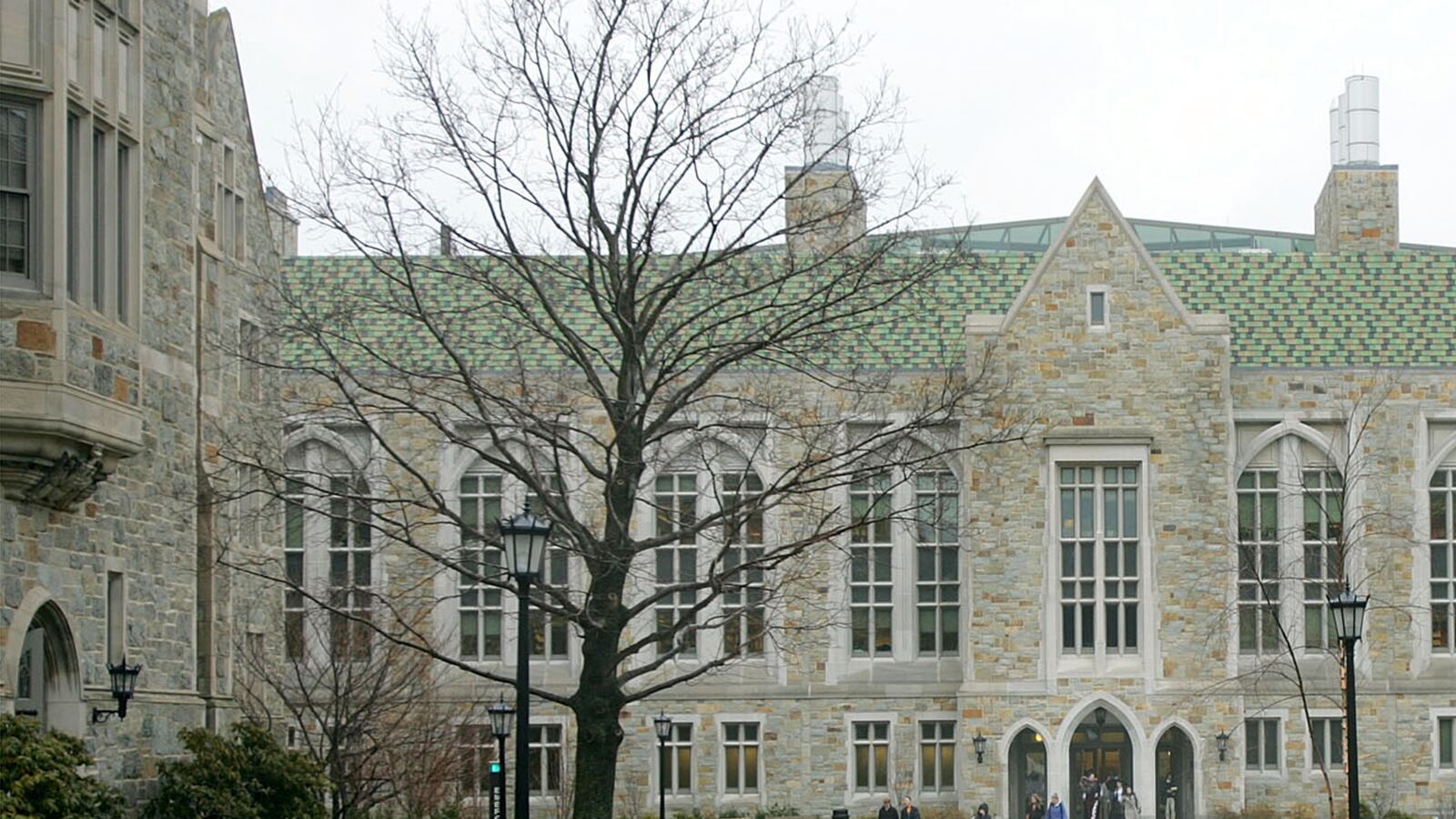Condoms are handed out like lollipops at many public and private universities across the country. But at Boston College, distributing rubbers on campus is now grounds for expulsion.

Most college students in the U.S. have access to a full menu of sexual health resources, from STI testing to Plan B and the NuvaRing. But as of March 15, the Jesuit University has threatened to take disciplinary action against a group of students if they continue giving out rubbers on campus—specifically in student-run Safe Sites, a network of dorm rooms and other locations where prophylactics are passed from peer to peer.
In a letter signed by Paul J. Chebator, the dean of students, and George Arey, director of residence life, school officials told students living in the Safe Sites that distributing condoms was in conflict with their “responsibility to protect the values and traditions as a Jesuit, Catholic University.”
The BC condomonium has since made national news, highlighting the Catholic Church’s influence on health care in both the public and private sphere. Other private Catholic schools have expressed support for BC administrators. Providence College, Holy Cross, Notre Dame, Georgetown, the University of Dayton, and Stonehill University have all stated that their school's policies ban distributing prophylactics on campus and that doing so would result in disciplinary action. But the American Civil Liberties Union is standing behind BC’s students, prepared to take legal action if the school doesn’t rescind its disciplinary threat—a move that violates the Massachusetts Civil Rights Act, according to an ACLU spokesman.
“It was a disappointing shock to us, especially because our relationship with both signatories and other administrators has been very positive and transparent up to this point,” Lizzie Jekanowski, current chair of BCSSH, told The Daily Beast of the letter. She and other members have co-sponsored campus talks on the intersection of spirituality and sexuality with Dean Chebator’s office since the group’s inception four years ago. Back then, when they began leaving condoms on dormitory doors that were designated Safe Sites, administrators suggested the students hand them out from their own dorm rooms—away from the school’s omniscient eye.
Now the same administrators are threatening to do away with BC’s Safe Sites all together, which currently operate out of 16 dorm rooms, one off-campus house and one faculty member’s house. “This group of students was warned repeatedly that distribution of condoms from our resident halls was a violation of the University’s code of conduct,” Dean Chebator wrote in an email to The Daily Beast. “When they persisted in their actions, they received a written warning as would any other students who violated our policies.”
It’s understandable that a Jesuit, Catholic institution doesn’t want condoms on campus, but does it really make sense to punish students for educating each other about making safe decisions?
“Students will always have sex, so from a public health standpoint we wanted to provide the necessary resources to encourage safe sex,” said Scott Jelinek (’10), one of the founding members of BCSSH.
The latest condom crackdown marks the first time BC has threatened disciplinary action against the group, though the school has tried to thwart condom distribution on and around campus in the past.
It all started in 2009, when Jelinek and other students organized a referendum on the ballot for the Undergraduate Government of Boston College candidates, after receiving 1,000 signatures on a petition calling for better access to sexual health resources on campus. Ninety percent of the students who voted that year supported the referendum. Professors wrote letters encouraging Boston College administrators to take action. When the school refused to budge, Jelinek and other students stepped up to fill the need for better access to sexual health resources on campus.
The group obtained permits from the city of Newton and, thanks to funding and donations from outside organizations, began distributing condoms and sex-ed pamphlets on public sidewalks around the university on Fridays, urging students to “have a safe weekend!” One afternoon, campus police tried to arrest them for trespassing, despite the fact that they were on public property. With no legal leg to stand on, school administrators turned a blind eye. In the next two years, the group handed out more than 20,000 condoms to BC students.
On other occasions when BCSSH members have met with school officials in person, the issue of Safe Sites has been a point of contention, according to Jekanowski. “But there was never any talk of disciplinary action in these meetings.”
So why the sudden turnaround?
In an interview with NBC News, school spokesman Jack Dunn said the group’s safe-sex initiatives have “become an attempt to make a mockery out of Catholic values,” adding, “if these students had been circumspect, discreet, private—it would never have come to a head.”
Dunn told The Daily Beast that BCSSH students were distributing condoms on campus on Ash Wednesday—a statement the group vehemently denies.
“We have always respected BC’s Jesuit, Catholic traditions and holy days,” said Jekanowski. “We were passing out flyers, not condoms, for an off-campus event the following day.”
Jelinek added: “The Safe Sites program seeks to keep students healthy; it is not a political or religious protest. This is an issue of student health and safety.”
In an open letter to The Boston Globe, a handful of BC professors echoed Jelinek’s stance, writing that “discouraging contraception only leads to unsafe sex.”
But others disagree. In a separate letter published in The Globe on April 2, a BC alumnus said the professors’ argument was “fundamentally flawed” and that the school should encourage students to “leave campus occasionally, take personal responsibility, and develop independence.”
In other words: they should buy condoms on their own, off-campus, like most other adults in the real world.
It’s an argument that will likely be reinforced by school administrators to students on April 29, when they next meet with Jekanowski and other BCSSH members.






